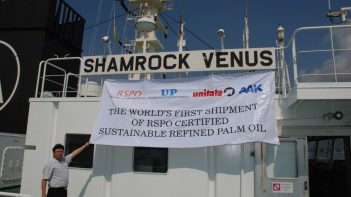The first meeting for RSPO FFB Legality and Traceability Task Force kicked off recently in Jakarta, Indonesia.
The newly established task force held a mandate to work towards producing an improved supply chain standard to assure the traceability of robust Fresh Fruit Bunches (FFB). The Task force took into account all legal requirements related to the implementation of the new indicator of 4.1.4 in the RSPO Principles & Criteria 2013, where mill(s) shall record the origins of all third-party sourced FFB.
The meeting was attended by 17 constituent representatives, including Indonesian growers, Malaysian growers, financial institutions, environmental NGOs, IDH and RSPO Secretariat. The task force appointed Sabarinah Marzuky from Sime Darby and Bpk. Agung from WWF Indonesia as Interim Co-Chairs.
The meeting began with a presentation on FFB Trading from a Landscape Perspective conducted by Earth Innovation Institute followed by IDH sharing their experience in managing the Palm Oil Traceability Working Group initiative.
The task force’s term of reference was one of the main topics discussed at this first meeting in addition to key activities for 2015, among which will be to pilot and share the approaches for FFB legality issues to wider stakeholders that will complement each other.
To complete the structure and continue on this progressive journey, the taskforce agreed to reconvene in April, in Kuala Lumpur, Malaysia.
Keep reading

RSPO hosts first Africa downstream sustainable palm oil supply chain forum in Cape Town

Nearly two decades on, Europe continues to drive global demand for RSPO Certified Palm Oil

Communicating Sustainable Palm Oil - examples of success across Europe
[EOT] Terms of Reference: Independent Smallholders Outreach Programme in Indonesia

RT2023 Delegates Propose Solutions to Reinforce RSPO’s Assurance System – End-Year Highlights of Assurance Standing Committee
RSPO UK Members' Day Examines Shifting Dynamics of Doing Business within Europe

Celebrating 20 Years of RSPO’s Sustainability Journey




